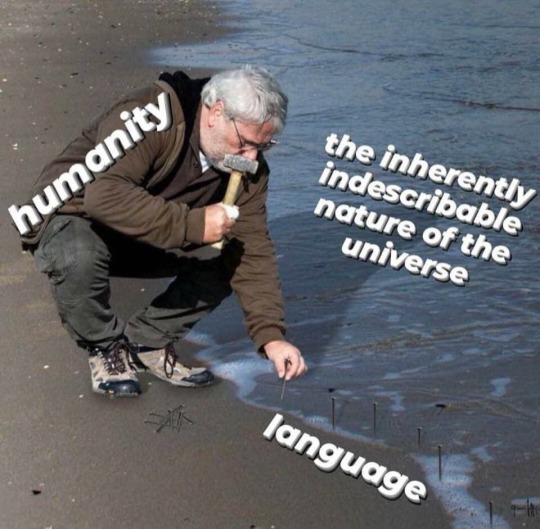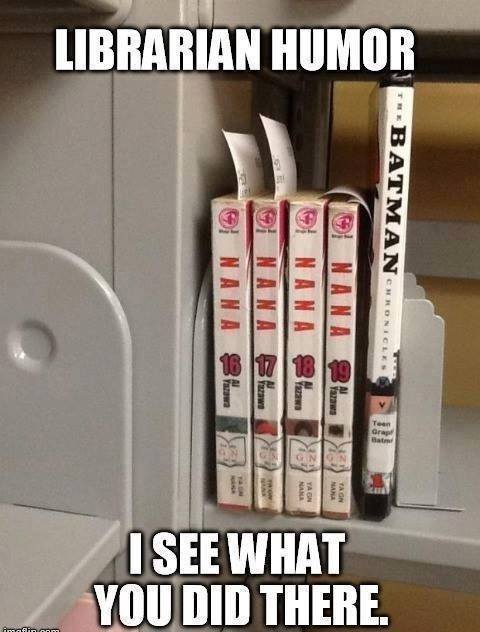she/her • christian • writer • reader • adhd • isfj • 9w1 || current hyperfixation: emily wilde's encyclopedia of faeries | wips: wisteria and wanderlust • idk, dragons • the flourecent iguana • untitled academic rivals wip • the adventures of lyra and timmble || insta: lyra.brie
Don't wanna be here? Send us removal request.
Text
not romantic not platonic but a secret third thing [what would happen between earth and the moon if the earth stopped spinning as illustrated by xkcd randall munroe]
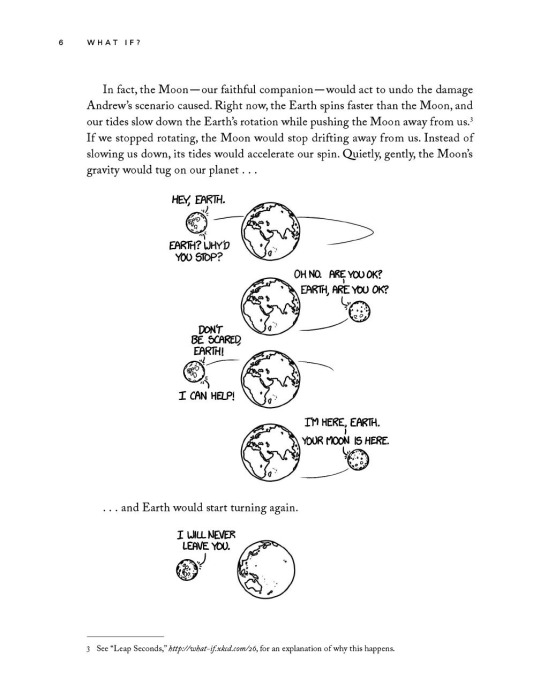
135K notes
·
View notes
Text
I want to see a work of fiction that reverses the "vampires are snobby upper class, werewolves are brutish lower class" stereotypes
80K notes
·
View notes
Text
I want to see a work of fiction that reverses the "vampires are snobby upper class, werewolves are brutish lower class" stereotypes
80K notes
·
View notes
Text
public libraries are so sick. there are five books I want to read and they're all relatively new so they're only available in hardback which is so expensive but it just cost me $0 to place holds on them. five books for zero dollars. it requires nothing but clicking a button and then going to the library to pick them up when they're ready. zero dollars. that's crazy
21K notes
·
View notes
Note
Lmao you’re an adult, you shouldn’t be using the word squick. Use trigger. Use your grown up adult words to explain how you feel instead of leaning on a cutesy uwu term that no one outside of tumblr uses. It’s embarrassing.
Idek if this is serious or ironic honestly
91K notes
·
View notes
Text
In the end, if children bother you for sensory reasons and that's why you don't want them to be in the same public spaces as you, there are disabled adults who can and would cause the same sensory issues for you. Adults who are loud, who vocally stim, who have poor boundaries, poor hygiene, who cry in public, etc etc etc. And they're already socially ostracized for all of this.
So actually yeah, it's the bare minimum you can do for the group with the least human rights on the planet to figure out how to accept children as part of your public community without hating them for it, even if you are child-free yourself.
#I HAVE SO MANY FEELINGS ABOUT THIS#yes kids can be hard to be around. that is a valid feeling#that means you avoid them or you learn how and when you can handle them#learning how to interact with kids could be a major help to some of you who are overwhelmed by them#and while just research and asking people who have kids are great options... some of that does have to come from just#spending time with kids#if you dont know how to interact with a type of people#you dont ban them from public spaces. you *learn*.#do you know how much it would change for kids who are being bullied or abused-who *expect* meanness from you#to feel wanted? to get even the bare minimum of kindness from strangers?#they are our future. we have to let them learn how to be people and they need love and care for that
15K notes
·
View notes
Text
Finding The Write Time [ 01 ]
hello and how are you, fellow Wanderers?
Welcome to our very - very very very very oh gods this is so late who let us not do anything for this long we are so sorry - very belated introduction to a Challenge we are going to be throwing ourselves into! This is hosted and done by the wonderful and marvelous Zac, @did-i-do-this-write, and we really want to jump into this!

Photo by Ales Krivec on Unsplash
The Challenge Rules
Use a prompt to write a complete story in 30 minutes or less. Whether it ends up being 100 words or 1000, the goal is to completely brainstorm, plan, and draft a piece of writing in a single writing session.
⊱ ���── {.⋅ ✯ ⋅.} ─── ⊰
The Prompt Masterlist
This is where we will throw all of our writings to the prompts once they are up and going!
⚜ [ Prompt Responses To Be Added ]
⊱ ─── {.⋅ ✯ ⋅.} ─── ⊰
This is going to be updated and reblogged with the all of the proper links and responses so keep an eye out for this post if you want to see what we're up to!
6 notes
·
View notes
Text
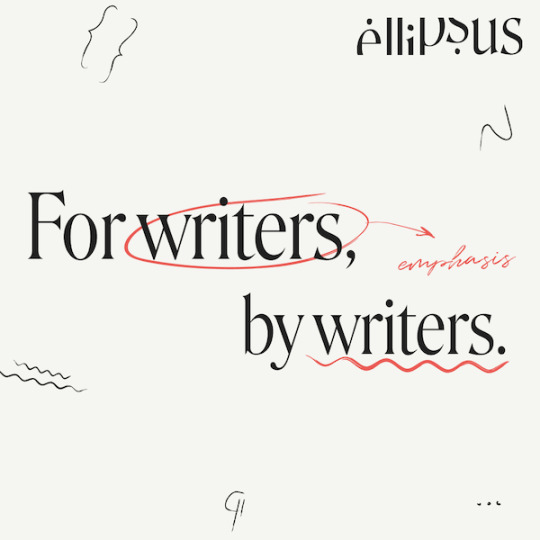
Collaborative writing is a labor of love. What if it could be easier?
Think connected drafts, not disconnected files.
Think effortless version history and control.
Think in-document chat.
Far away from the prying eyes of AI and LLMs.
Ellipsus is a new writing tool for people who write together!
Two new features have arrived this week: Comments and Dark Mode! :D
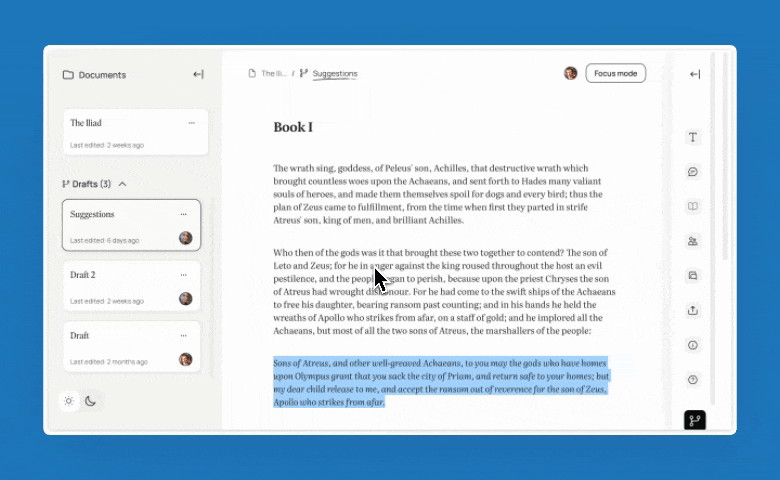
We’re looking for feedback from folks who care a lot about writing.
Check us out, and join the Ellipsus beta.
18K notes
·
View notes
Text
bizarre neurodivergence things
Nesting
Hoarding things
Taking things apart
Wandering
Shitty memory
Needing pressure on your body to sleep
106K notes
·
View notes
Photo
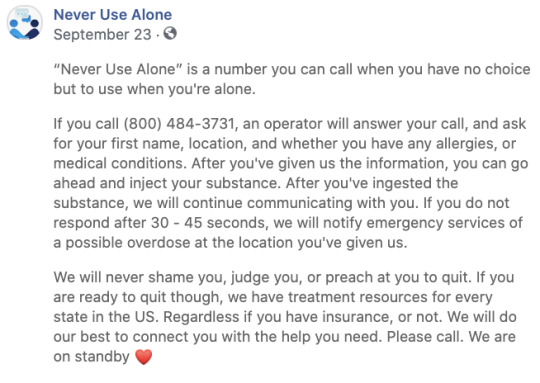
Ending the stigma of drug use will save lives.
187K notes
·
View notes
Text
people misunderstand what ‘gifted kid’ actually means but it’s ok it’s fine it’s cool it’s good
141K notes
·
View notes
Text

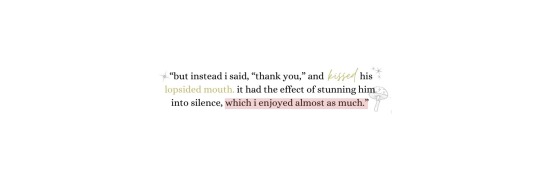


— emilywendell headers. (emily wilde’s encyclopaedia of faeries) 🍄
like/reblog if you save or use.
art credits: @naman_doodles
153 notes
·
View notes
Text
had to explain to a customer my policy of "reckless kindness" today
is the thing I'm doing probably not what I'm supposed to? yeah. am I gonna do it anyway because it makes your life a little softer? for sure
so no I won't charge for those three pages of passport forms you're clearly stressing about. I will spend that extra ten minutes editing your file to make it look exactly how you want. I will throw whatever discount I can onto that order, or "forget" to charge for part of it
because this job sucks sometimes and life sucks all the time, and knowing that I made it suck just a little less is all I can take home some days
also breaking the rules. breaking the rules is always fun
#DO GOOD RECKLESSLY#DO GOOD MISCHIEVIOUSLY#just love people and have as much fun as possible with it and dont worry about if its “deserved” or if theyre going to “abuse” it
16 notes
·
View notes
Text
I am sorry to everyone who tagged me in some tag game and I never responded. I saw it and thought “aww they thought of me” and proceeded to forget about it right after
68K notes
·
View notes
Photo
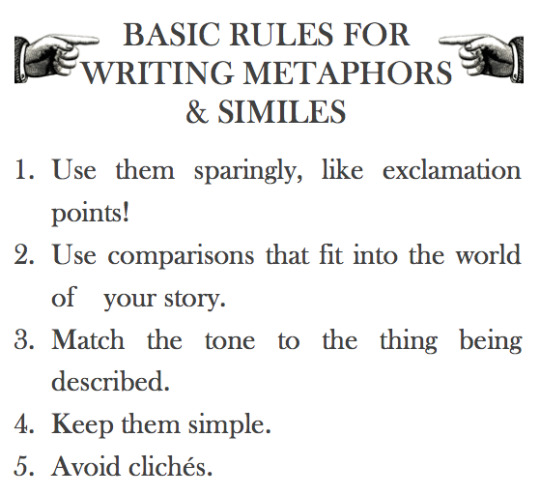
RULE #1: Use them sparingly.
Comparisons draw attention to themselves, like a single red tulip in a sea of yellow ones. They take the reader out of the scene for a moment, while you describe something that isn’t in it, like you’re pushing them out of the story. They require more thought than normal descriptions, as they ask the reader to think about the comparison, like an essay question in the middle of a multiple choice test. They make the image stand out, give it importance, a badge of honor of sorts.
Use too many comparisons and they become tedious.
Elevating every single description is like ending each sentence with an exclamation point. Eventually, the reader decides no one could possibly shout this much, and starts ignoring them.
For these reasons, you should only use metaphorical language when you really want to make an image stand out. Save them for important moments.
RULE #2: Use comparisons that fit into the world of your story.
If you’re writing from the point of view of a character who’s only ever lived in a desert, having that character say, “her look was as cold as snow” doesn’t make much sense. That character isn’t likely to have experienced snow, so it wouldn’t be a reference point to them. They’d be more likely to compare the look to a “moonless desert night” or something along those lines.
Using a comparison that ties to the character’s history or the setting of the story also do work to build the world of the story. It gives you a chance to show the reader exactly what your character’s reference points are, and builds the story’s world. If your reader doesn’t know that desert nights can get cold, this comparison informs both the things its describing: the other character’s look and the desert at night.
Here’s a metaphor from The Hitchhiker’s Guide to the Galaxy:
If you took a couple of David Bowies and stuck one of the David Bowies on the top of the other David Bowie, then attached another David Bowie to the end of each of the arms of the upper of the first two David Bowies and wrapped the whole business up in a dirty beach robe you would then have something which didn’t exactly look like John Watson, but which those who knew him would find hauntingly familiar.
He was tall and he was gangled.
This is a bizarre comparison, but it’s also a bizarre story. What’s more, David Bowie is known for his persona “Ziggy Stardust” and songs like “Space Oddity.” Bringing him up in a book about a man from Earth traversing the galaxy makes sense. What’s more it increases both of those aspects of the story: its ties to space and its bizarre-ness. The comparison unifies the story and the language being used to tell the story.
Using comparisons that fit into the world ensures that everything is working to help tell the story you want to tell.
RULE #3: Match the tone to the thing being described.
Or, match it to the way you want the thing being described to come across. It has to match what you want the reader to feel about the thing being described.
Here’s an example from Mental Floss’s “18 Metaphors & Analogies Found in Actual Student Papers” (although I think it’s actually from a bad metaphor writing contest):
She had a deep, throaty, genuine laugh, like that sound a dog makes just before it throws up.
You’re not imagining a laugh right now, are you? You’re imagining a dog throwing up. Whoever this girl is, you’re going to make sure never to tell a joke in front of her.
This is not getting the right point across.
Remember the David Bowies? Remember how the comparison was fun and bizarre, just like the tone of the book is fun and bizarre?
This is not David Bowies stacked on top of one another.
It’s not enough for a comparison to be accurate. It has to bring about the same emotions as the thing it’s describing.
If this is being told from the point of view of a character who hates the laughing character and we’re supposed to hate her and her laugh. It actually does work, but from the use of the word “genuine,” I don’t think this is the case.
Make sure you always pay attention to the tone of the comparison.
RULE #4: Keep them simple.
Don’t use a comparison that requires too much thought on the reader’s part. You never want anyone sparing even a moment on the question: “but how is x like y?”
Here’s another example from that Mental Floss list:
Long separated by cruel fate, the star-crossed lovers raced across the grassy field toward each other like two freight trains, one having left Cleveland at 6:36 p.m. traveling at 55 mph, the other from Topeka at 4:19 p.m. at a speed of 35 mph.
Again, this is a humorous example. It’s supposed to be bad, but many writers have made mistakes like it. They choose two images that don’t have enough in common for the reader to make an easy and obvious comparison between the two. Sometimes, the writer subconsciously acknowledges this, and expands the comparison to a paragraph, detailing the ways the two things are alike.
If you find yourself doing this, take a step back and ask yourself if this is really the best comparison to be using. The best comparisons are the simple ones. All the world’s a stage. Conscience is a man’s compass. Books are the mirrors of the soul.
What about that David Bowie quote, you ask? Douglas Adams broke this rule, but he broke it purposefully to get that bizarre quality to the language. He still avoids reader confusion, the reason for this rule, by bringing the comparison back to its point at the end: “he was tall and he was gangled.”
RULE #5: Avoid cliches.
The best comparisons are fresh ones. No one wants to hear that she had “skin as white as snow” and lips “as red as roses” anymore. The slight understanding it brings to the description isn’t worth the reader’s groans when they realize you just made them read that again.
A cliche is a waste of space on the page. It’s not going to be the memorable line you want it to be. It’s not going to awe the reader.
Good similes in metaphors require some creative thinking.
In the vein of rosy lips and snow-colored skin, here’s a fun example from Harry Potter and the Chamber of Secrets. It’s the poem that Ginny wrote for Harry on Valentine’s Day:
His eyes are as green as a fresh pickled toad,
His hair is as dark as a blackboard.
I wish he was mine, he’s really divine,
The hero who conquered the Dark Lord.
These aren’t comparisons you’re like to have come across before and their originality comes from rules #2 and #3. Rowling needed comparisons that fit in Ginny’s frame of reference. She also needed comparisons that were humorously bad, as they’re being recited by a grumpy creature dressed in a diaper, who is sitting on Harry’s ankles, forcing him to listen.
As a witch at school, blackboards and fresh pickled toads fit Ginny’s frame of reference. Neither are particularly known for being nice to look at, so they fit the tone, too.
Using her character, setting, and tone, using, in other words, her story, Rowling was able to create similes that are unique and memorable.
It’s the same thing Adams did with his Bowie analogy.
If you, too, use your story to inform your language, writing new and wonderful similes and metaphors should be just as simple.
2K notes
·
View notes
